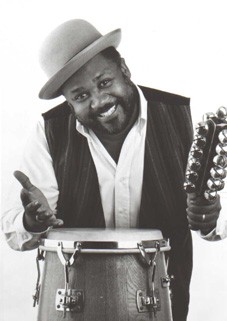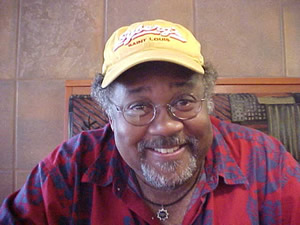The Artist as Entrepreneur |
Blake
Travis
|
Blake Travis is a native Saint Louisan and has lived most of his life in the Webster Groves area. He attended both elementary school and high school in Webster Groves. While attending school, he learned to play the oboe, beginning in fourth grade. Travis has been playing music professionally since he was fifteen years old and made music with a group in his neighborhood. That was when he first worked with Joe Bidewell, a musician with whom Travis would have an ongoing working relationship for years. After living and working in Columbia, MO, and San Francisco, Travis joined forces with Bidewell, and they spent two years performing in Colorado in the early 1970's. Showcases in New York, some acting off-Broadway, and work in Germany followed for Travis. By 1979, he was back in St. Louis. Travis has been performing with the Road Apples, most recently at the 2004 St. Louis Art Fair, and he also plays percussion for Dangerous Kitchen. He has been named Artist of the Year by Young Audiences of St. Louis for 2004. He performs as a vocalist, an actor, and a storyteller for the group. Blake Travis and his wife, Nettie, have a nine-year-old daughter, Morgan. Travis has a son, Josh, also a musician, and a daughter, Lilah, by a previous marriage. He is also the grandfather of 11-month-old twins, a boy and a girl. The following interview with Blake Travis was conducted by Cheryl Blake, UM-St. Louis, September 2004. Q. What is your history with music? A. I started playing music in the neighborhood when I was fifteen. In 1966 the group Joe Bidewell and I had called ourselves the Soul Brothers. I sang and played percussion. But I had classical training, too. I had begun studying the oboe in fourth grade and had continued through high school. Then there was the rhythm and blues I had grown up with at home. I attended St. Louis Community College at Meramec from 1970 to 1972 and then moved to Columbia and played music there. I moved on to San Francisco and Joe visited me. We realized then that we really worked well together. We could interpret one another without even talking. So we spent a couple years in Colorado performing at the ski areas during the winter seasons. He played keyboard, and I played percussion, and we both sang. He was also writing songs. He's quite a songwriter. In 1975, I was in New York City and played a showcase with Billy Crystal and one with Talking Heads, among others. I kept at it and wound up back in St. Louis in 1979. I had an offer to record an album with a rock group in Columbia, and Joe and I got back together, playing old soul and rock and songs he wrote. We added a bass player called Ferd. He had been an original with John Mellencamp. Just recently, I have been playing with the Road Apples. We do a kind of bluegrass, rock, and Cajun style and we are working on a CD. I'm also appearing with Dangerous Kitchen, but their last engagement will be in October. Their sound is more funk/soul/rock. And I will be playing some music with Scott Brian, an alum of Cheryl Crow's band. Q. What about the storytelling? A. January Kieffer was asked by the St. Louis Art Museum to do some storytelling with a Caribbean exhibit. She was looking for someone to play drums as she performed, and she was referred to me. Then we were asked by the Louisville schools to perform in their schools. One day I chimed in. I responded at a point where it seemed appropriate to have another voice. She liked it, and we continued to work in tandem, an unusual situation for storytelling. We also did diversity workshops. In the "Story Performances" we would act out vignettes about bias and then lead discussions. We went to Washington, D.C., Miami, New York, and across the country. I also worked with Gary Muzinsky of One World Music, in a program called "Synergy Through Samba." Large corporations like Ford had us give workshops. I am involved in several performances for Young Audiences. I have found traditional stories that are African, African American, Native American, European, and Asian. The stories are meant to entertain, but they still have a moral. I was also asked by the History Museum to write a story about Scott Joplin. And I do some work for the Missouri Humanities Council. Through Read from the Start, I help parents learn how to read to their children. I perform at UMSL's storytelling festival each year, as well. Q. At what point did this all become your sole livelihood? A. In 1993, I was the manager of a transportation company. It was my nine-to-five job, and I did the music at night. I realized I couldn't sustain myself that way. I believe in the arts, and I wanted to influence others in a positive way.
It isn't an easy economy. It's a humbling moment when I see how much has come to me. When I was in college, I was thinking sociology--for social work. It would have been good to take marketing and business courses had I known the business I would get into. But, with the help of my wife, I have been able to do this since 1993. copyright 2004, Center for Entrepreneurship and Economic Education, University of Missouri-St. Louis
|

